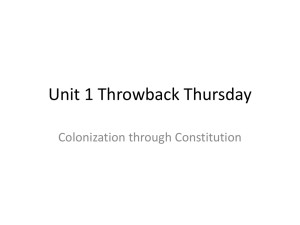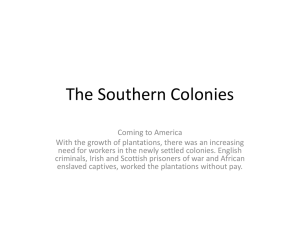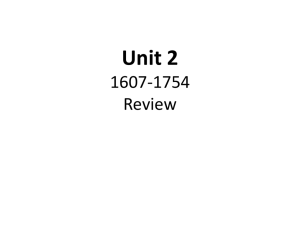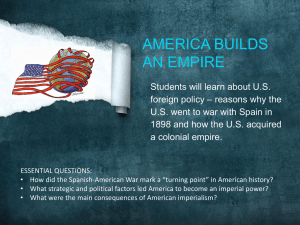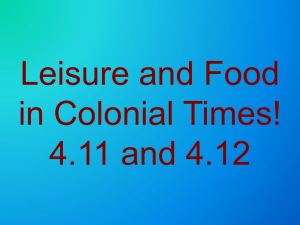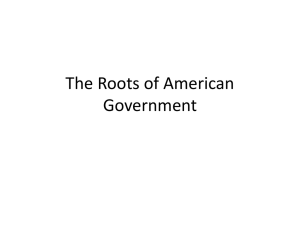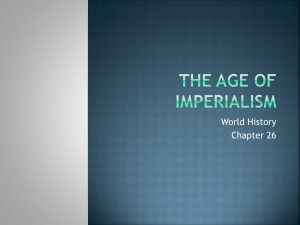Problems within the Colonies
advertisement
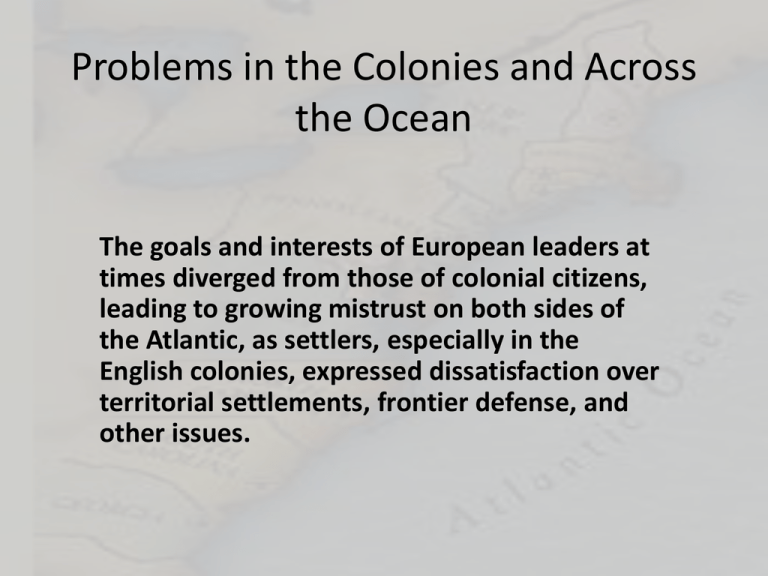
Problems in the Colonies and Across the Ocean The goals and interests of European leaders at times diverged from those of colonial citizens, leading to growing mistrust on both sides of the Atlantic, as settlers, especially in the English colonies, expressed dissatisfaction over territorial settlements, frontier defense, and other issues. Problems in the Colonies and Across the Ocean Kidwill Main Issues 1. Half-Way Covenant (social / religious) 2. King Philip’s War (territorial) 3. Bacon’s Rebellion (economic / territorial) 4. The Mercantilist Relationship (economic) -Acts of Trade and Navigation 5. The Dominion of New England (economic) Half-Way Covenant • One aspect of being a Puritan was experiencing a conversion. • Conversion was a rejection of worldliness and acceptance of strict Biblical principles. • By the 1660s fewer people (especially the generation born in New England) were experiencing a conversion. • In an attempt to maintain influence and membership the half-way covenant was offered by some members of the clergy. Half-Way Covenant • Those that had not experienced conversion were not allowed to hold political office or vote. • When the Salem Witch Trials began in 1692 some Puritans believed that it was proof that God had deserted the people because they had opened the church to sin. • The debate endured for generations and shows how quickly the Puritan beliefs were eroding in the new world. King Philip’s War 1675 - 1676 • Considered the first major war with the natives and it is also said to be the bloodiest war in American history on a per capita basis. • The war started over a minor incident after cattle belonging to English settlers trampled on corn belonging to Native Americans. • The natives killed some cows, white settlers killed some natives. • The natives under the direction of Metacom (nicknamed King Philip) started attacking remote farms and small townships. • Metacom was the son of Massasoit. He had helped the Pilgrims survive their first winter at Plymouth. King Philip’s War • The English settlers initially took such heavy losses that they soon believed that God was punishing them (Puritans) for not strictly following the religious codes. • They scapegoated religious minorities like Quakers and Christian Indians, blaming them for their misfortunes. King Philip’s War • Fifty-two English towns were attacked and a dozen of them were destroyed. • 2,500 colonists died, approximately 30% of the New England population. • At least twice as many natives died. • Some historians believe that between war, disease and starvation, half of the native population perished during the fighting. • Many tribes were disbanded completely due to the war. King Philip’s War 1675 • The natives spent much of the summer fighting the settlers and neglected their crops. • The harsh winter and starvation turned the tide in favor of the colonists. • The war eventually fizzled out in Southern New England in 1676 after the death of Metacom but it lingered in Northern New ENgland until 1677. Problems in Virginia • Despite becoming a royal colony in 1624 problems persisted for the Virginia colony, many of them were economic in nature. • An increasing population of small landowners (or landless / former servants) were putting pressure on the frontier which led to conflicts with the natives. • In addition, tobacco prices had fallen and taxes had increased on Virginians, some in response to the Anglo-Dutch Wars. Problems in Virginia • A series of small attacks by colonists on the native (Doeg and Susquehannock) tribes led Governor Berkley to continued to urge colonists to show restraint. • Governor Berkley ordered an investigation into the hostilities and set up a meeting between tribal chiefs and antagonist colonists. • The meeting ended in disaster when several tribal chiefs were murdered. • Many disagreed with Berkley’s attempts to maintain calm and wanted to drive the natives from the area completely. *Berkley may have been exercising caution due to King Philip’s War in New England Bacon’s Rebellion • Nathaniel Bacon was a rebel leader that started attacking Indian settlements, he was also Berkley’s cousin. • Berkley had enough popular support to get elected to the House of Burgesses despite his rebel status. • When he arrived in Jamestown to take his seat a confrontation occurred with Berkley. Bacon’s Rebellion • Jamestown was in disarray for several months in 1776 as control of the town shifted back and forth. • Bacon eventually burned Jamestown to the ground and soon after died of disease and the rebellion fell apart. • Berkley cracked down on the followers of Bacon, seizing property and ordering 23 of them hanged. The Legacy of Bacon’s Rebellion • Bacon’s Rebellion led to other colonies taking a stronger stance against the natives. • The native tribes in Virginia were largely gone within a generation of the rebellion. • The rebellion led many to seek a work force that would be easier to control (slave) rather than temporary white servants that would be set free to demand rights and access to land. • *For many years Bacon’s Rebellion was viewed as the opening scene in the American War for Independence. In more recent years some historians have rejected this and mostly view it now as an event in Virginia independent of any animosities with the king. Mercantilism • Mercantilism was an economic policy that looked upon trade, colonies, and the accumulation of wealth as the basis for a country’s military and political strength. • Mercantilist doctrine required that a government regulate trade and production to enable it to become self- sufficient. • Colonies were to provide raw materials to the parent country so the parent country could make products to send back to the colony. The Acts of Trade and Navigation • 1650-1673- established rules meant to enforce a mercantilist policy and cut the Dutch out of trade. 1. Trade to and from the colonies could only be carried on English or colonial ships operated by English or colonial crews. 2. All goods imported to the colonies (very few exceptions) had to pass through ports in England. 3. Certain “Enumerated” goods from the colonies could only be exported to England only. Originally tobacco but later sugar, rice and more. The Acts of Trade and Navigation • The Navigation Acts had a mixed effect on the colonies. -allowed New England ship building to prosper -provided English military forces to protect the colonies from the French and Spanish -severely limited the development of colonial manufacturing -caused colonists to pay high prices for manufactured goods Questionable Practice • The North American colonies already had a natural trade relationship with England anyway. • The acts strained the relationship between the English government and colonies. • The English were lax in enforcement (creating inconsistencies) and English agents in the colonies with the responsibility for enforcement were notoriously corrupt. • Smuggling occurred of Dutch and French goods, especially in New England which eventually led to Massachusetts Bay having its charter revoked. The Dominion of New England • James II (crowned in 1686) wanted to increase royal control over the colonies by combining them into larger administrative units and do away with representative assemblies. • In 1686 he combined New York, New Jersey and the various New England colonies into the Dominion. • Sir Edmund Andros was the Royal Governor of the Dominion and ruffled many colonial feathers in the process. He asked Puritan clergy to allow Anglican Church services in their meetinghouses, enacted new taxation laws, and tried to stifle local rule by limiting town meetings. The Dominion of New England • James II was removed in 1688 Impacts (Glorious Revolution) and • Many in New England replaced by William and resented the royal Mary. attempts at • Andros was imprisoned along consolidating power. with other royal officials after • The New England he attempted to dress as a economy suffered and woman and slip away. it seemingly created • His removal ended the more questions than Dominion but created other answers about land questions about how the New claims. England colonies should be chartered. Review Three Facts Each- complete sentences 1. Half-Way Covenant 2. King Philip’s War 3. Bacon’s Rebellion 4. The Mercantilist Relationship -Acts of Trade and Navigation 5. The Dominion of New England


